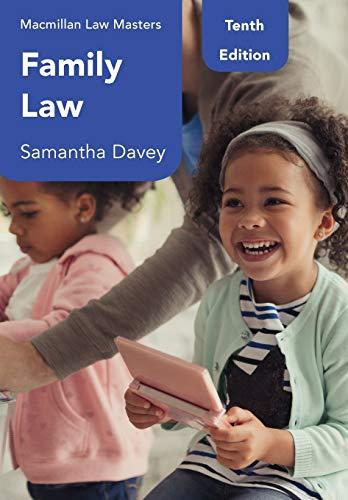Question
What is a statute? Multiple Choice Laws made by administrative agencies Laws made and applied by judges Laws made by the federal judiciary Laws made
What is a statute?
Multiple Choice
Laws made by administrative agencies
Laws made and applied by judges
Laws made by the federal judiciary
Laws made by Congress or a state legislature
Which of the following takes priority over a federal statute?
Multiple Choice
A state statute
The U.S. Constitution
A state constitution
An equitable principle
Congress has the power to regulate commerce among the states. Pursuant to this power, Congress passed legislation forbidding women from crossing state lines to buy or sell goods. Will the statute be held constitutional?
Multiple Choice
Yes, because federal laws are always superior.
Yes, because Congress has not exceeded its enumerated power in enacting the legislation.
No, because it conflicts with the equal protection guarantee.
Yes, because Congress has the power to regulate interstate commerce.
Which of the following is a characteristic of profit maximization?
Multiple Choice
It ensures complete responsible and ethical behavior by corporations.
It protects everyone's fundamental rights.
It is closely related to utilitarianism because it focuses on results.
It is concerned with the equal distribution of wealth in society.
Which of the following critical thinking errors is likely to occur among the subordinates if a leader is unethical?
Multiple Choice
False analogy
Bandwagon fallacy
False cause
Gambler's fallacy
When a court applies the exclusionary rule in a criminal case, it means that:
Multiple Choice
an arraignment will not take place.
the evidence seized in an illegal search will not be admitted at trial.
the defendant will be convicted.
the case will be dismissed.
Which of the following is a provision of the Sarbanes-Oxley Act of 2002?
Multiple Choice
It provided legal protection for employees who act as whistleblowers.
It decreased the maximum term of imprisonment for mail fraud and wire fraud to 15 years.
It imposed a maximum of 15 years of imprisonment as punishment for the destruction of documents.
It shortened the statute of limitations period within which certain securities fraud cases may be filed.
"White-collar crime" is the term used to describe a wide variety of offenses committed by:
Multiple Choice
businesspersons.
the average working class.
juveniles.
poor Americans.
Most serious crimes require mens rea, which is criminal:
Multiple Choice
behavior.
violation.
intent.
prosecution.
Strict liability offenses:
Multiple Choice
dispense with the requirement of proof of any criminal intent on the part of the defendant.
impose liability on a defendant for the act of third parties.
require proof of some form of mens rea.
are so classified because the punishments imposed on violators are especially harsh in comparison to the punishments for other criminal offenses.
The Fourth Amendment to the U.S. Constitution:
Multiple Choice
protects persons against arbitrary and unreasonable governmental violations of their privacy rights.
protects persons against all searches and seizures.
provides protection to places or items as to which the Supreme Court found no reasonable expectations of privacy such as open fields and personal bank records.
provides protection to matters such as voluntary conversations between criminal defendants and government informants.
Negligence "per se" is a legal rule that establishes a defendant's negligence when:
Multiple Choice
the plaintiff intended to harm the defendant.
both the defendant and the plaintiff intended to harm each other.
a statute intended to protect persons like the plaintiff has been violated.
the defendant intended to harm the plaintiff.
Step by Step Solution
There are 3 Steps involved in it
Step: 1

Get Instant Access to Expert-Tailored Solutions
See step-by-step solutions with expert insights and AI powered tools for academic success
Step: 2

Step: 3

Ace Your Homework with AI
Get the answers you need in no time with our AI-driven, step-by-step assistance
Get Started


